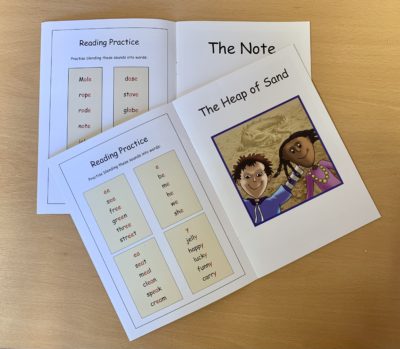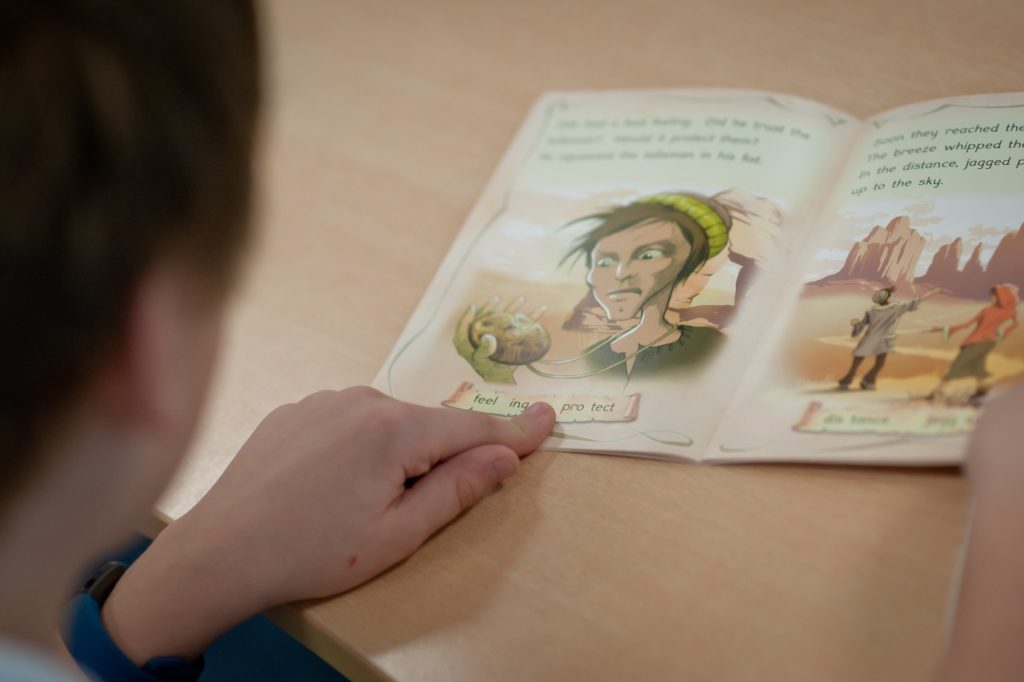We all mispronounce words from time to time, especially when they are unfamiliar to us. Speech and Language Pathologist, Miriam Fein, explores the important link between pronunciation and the development of vocabulary.
Every once in a while someone starts a thread on Twitter about words that they mispronounced for a long time because they only encountered them while reading. These threads are popular, often with thousands of likes and retweets. Clearly, many people can relate to this experience. The examples are entertaining, but they’re also instructive and interesting when examined in terms of reading and vocabulary development.
The usual suspects pop up. Many French words that have entered English like, ‘rendevous,’ ‘ennui,’ and ‘lingerie’ get analyzed through the lens of the most common correspondences in our English code. One example that resonates with me is ‘facade.’ I always pronounced it as ‘fa-kaid.’ Names like ‘Hermione’ and ‘Penelope’ and words like ‘hyperbole’ and ‘epitome’ show up a lot, with many pronouncing them with the sound of the ‘o–e’ or ‘split spelling,’ such that they get ‘hy-per-bowl’ and ‘e-pi-toam’.
These examples, and the fact that the same words keep coming up, highlight the statistical learning that is a key part of learning to read. When they first encounter an unfamiliar word, good readers apply their code knowledge to come up with a plausible pronunciation. A key feature of English writing is that one spelling (grapheme) can represent multiple sounds, so there are choices to be made. Readers don’t base these decisions on conscious knowledge of rules, but on probabilities–statistical patterns. Many children learn these patterns implicitly through grasping the alphabetic principle along with exposure. Some children need more repetition and controlled exposure.
 The spelling ‘e’ is not the most common way to spell the /ee/ sound at the end of a multisyllabic word. It’s far more likely to be spelled with a ‘y’ like in ‘therapy’, ‘artistry’ or ‘anatomy’. And readers tend to know that implicitly. So the /ee/ sound would not be the first choice for the end of a word like ‘epitome’. It’s more likely to be analyzed with an /oa/ sound for the ‘o-e’ spelling.
The spelling ‘e’ is not the most common way to spell the /ee/ sound at the end of a multisyllabic word. It’s far more likely to be spelled with a ‘y’ like in ‘therapy’, ‘artistry’ or ‘anatomy’. And readers tend to know that implicitly. So the /ee/ sound would not be the first choice for the end of a word like ‘epitome’. It’s more likely to be analyzed with an /oa/ sound for the ‘o-e’ spelling.
If the word is one they do not immediately connect with a word they’ve heard before, they might try a different sound until they get a word that ‘rings a bell.’ That’s what I teach my students to do when I prompt them to ‘listen for the word.’ But what if they’ve never heard the word? What if nothing ‘rings a bell?’ Well, if no one is there to tell us, we tend to go for the most statistically plausible pronunciation and just read on.
Importantly, what good readers don’t do is just skip the word. They give it a plausible pronunciation and they learn some aspect of its meaning in context. They will need to encounter this word many more times in different contexts to further develop their knowledge of the word’s meaning. That’s where the benefit of wide reading comes in.
Assigning the word a pronunciation, even if it’s the ‘wrong’ one, provides a hook to hang the bits of meaning on. If there’s no pronunciation, there’s no hook, and it’s a lost opportunity to learn a new word.
Sometimes this personal or ‘placeholder’ pronunciation sticks and, even though we hear the word pronounced conventionally, we may not immediately make the connection that it’s the same word we’ve been ‘mispronouncing’ while reading. But when we do, there’s an ‘aha-moment’ feeling. “Oh, that’s how you say that word!” And since we are hearing the word used, we develop even stronger links between sound, spelling, and meaning. It’s those links that are the key to skilled reading and the ones we always want to be reinforcing in our teaching.
Interestingly, a common feeling that comes up when people recall these words and, in particular, any public mispronunciation of them, is embarrassment. People comment, “I woke up in a cold sweat” or “I wanted to sink into the floor.” Maybe this speaks to how strongly people tie their verbal skills to perceptions of intelligence. They may not realize that these mispronunciations are actually an important step on the road to becoming highly literate!
#vocabulary #readingcomprehension #scienceofreading #mispronunciation
* * *
This is a guest blog post by speech-language pathologist and licensed reading specialist, Miriam Fein. Miriam lives near Boston, Massachusetts, and supports students from early elementary through high school with reading, spelling, writing, and language skills. She believes in the power of evidence-informed, systematic, and compassionate teaching for all learners.


